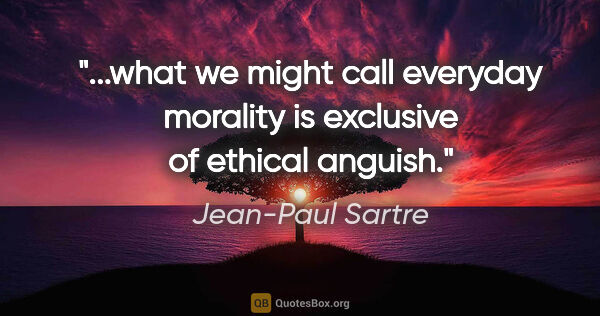Ethics Quotes (page 11)
The core symbols we use for God represent what we take to be the highest good.... These symbols or images shape our worldview, our ethical system, and our social practice--how we relate to one another. For instance, [Elizabeth A.] Johnson suggests that if a religion speaks about God as warrior, using militaristic language such as how "he crushes his enemies" and summoning people to become soldiers in God's army, then the people tend to become militaristic and aggressive. Likewise, if the key...
Sue Monk Kidd
Hence the sterile, uninspiring futility of a great many theoretical discussions of ethics, and the resentment which many people feel towards such discussions: moral principles remain in their minds as floating abstractions, offering them a goal they cannot grasp and demanding that they reshape their souls in its image, thus leaving them with a burden of undefinable moral guilt.
Ayn Rand
(Meli, are you sure these "humans" are on our side?)
(No ... but at least they are not Khieevi.)
(That is beginning to seem less and less of a recommendation. Like us in form, perhaps, but hardly in ethics.)
(That may not be entirely a bad thing. If they meet their friends with weapons in both hands, what do you suppose they do to their enemies?)
Anne McCaffrey
There is no such thing as not worshipping. Everybody worships. The only choice we get is what to worship. And an outstanding reason for choosing some sort of God or spiritual-type thing to worship--be it J.C. or Allah, be it Yahweh or the Wiccan mother-goddess or the Four Noble Truths or some infrangible set of ethical principles--is that pretty much anything else you worship will eat you alive.
David Foster Wallace
Here is the point about myself and my co-thinkers. Our belief is not a belief. Our principles are not a faith. We do not hold our convictions dogmatically. We believe with certainty that an ethical life can be lived without religion. And we know for a fact that the corollary holds true - that religion has caused innumerate people not just to conduct themselves no better than others, but to award themselves permission to behave in ways that would make a brothel-keeper or an ethnic cleanser...
Christopher Hitchens
I suppose the most important thing, the heaviest single factor in one's life, is whether one's born male or female. In most societies it determines one's expectations, activities, outlook, ethics, manners—almost everything. Vocabulary. Semiotic usages. Clothing. Even food. Women... women tend to eat less... It's extremely hard to separate the innate differences from the learned ones. Even where women participate equally with men in the society, they still after all do all the childbearing,...
Ursula K. Le Guin
[W]e must recognize that ethics requires us to risk ourselves precisely at moments of unknowingness, when what forms us diverges from what lies before us, when our willingness to become undone in relation to others constitutes our chance of becoming human. To be undone by another is a primary necessity, an anguish, to be sure, but also a chance--to be addressed, claimed, bound to what is not me, but also to be moved, to be prompted to act, to address myself elsewhere, and so to vacate the...
Judith Butler
Abuse of the military metaphor may be inevitable in a capitalist society, a society that increasingly restricts the scope and credibility of appeals to ethical principle, in which it is thought foolish not to subject one's actions to the calculus of self-interest and profitability. War-making is one of the few activities that people are not supposed to view 'realistically'; that is, with an eye to expense and practical outcome. In all-out war, expenditure is all-out, unprudent--war being...
Susan Sontag

